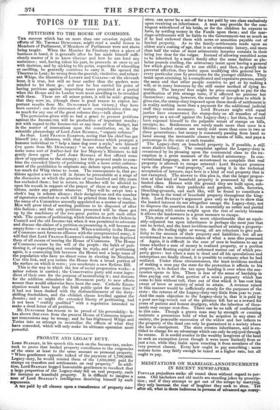TOPICS OF THE DAY.
PETITIONS TO THE HOUSE OF COMMONS.
Tuts success which has on more than one occasion repaid the efforts of Mr. THOMAS Dumeoiette, might read a useful lesson to Members of Parliament, if Members of Parliament were not above being taught. When the Member for Finsbury takes a piece of business in hand, it is generally after he has made himself suffi- ciently master of it to know whether and how he can lend any assistance ; and, having taken his part, he proceeds at once to act with decision, and by sticking to his point, regardless of wheedling or cavilling, he generally contrives to carry it. He opened the Theatres in Lent ; he wrung from the peevish, vindictive, and reluct- ant Whigs, the liberation of Loverr and Commis—at the eleventh hour, it is true, but still an hour earlier than the gaolers were minded to let them go; and now he has carried his point of having petitions against impending taxes presented at a period
when the House and its Leader were most unwilling to be troubled with them. These are all minor points, it will be said : granting that they were :so, (though there is good reason to expect im- portant results from Mr. DUNCOMBE'S last victory,) they have been carried; can the statesmen of more comprehensive aims say as much for any one of the great reforms they—talk about ?
The permission given with so bad a grace to present petitions against the Income-tax will be productive of important results ; not with regard to the Income-tax or any item of the Budget, but in the matter of innovations upon the constitution, or, in the scientific phraseology of Lord Jour; RUSSELL, "organic reforms." As thus. Lord FRANCIS EGERTON, seeing that his chief has got himself into a dilemma, with that benevolence which prompts a humane individual to " help a lame dog over a style," sets himself (we quote from Mr. DUNCOMBE) "to see whether he could not make some sort of feather-bed for her Majesty's Ministers to fall gently down upon." Lord JOHN RUSSELL at first offered some show of opposition to the attempt ; but the proposal made to com- bine the extended liberty of petitioning with a more strict enforce- ment of the prohibition to originate any debate upon petitions, was too much for Whig virtue to resist. The consequence is, that pe- titions against a new tax will in future be presentable at a stage of the discussion at which the practice of one hundred and fifty years has excluded them ; but in return, no Member will be allowed to open his mouth in support of the prayer of these or any other pe- titions, under any pretext whatever. They will be swept into a clerk's bag in solemn silence ; their designations and the number of signatures attached to each will be printed from time to time, in the name of a Committee annually appointed as a matter of routine. Men will grow tired of sending petitions to be disposed of after this fashion ; and the only petitions presented will be those got up by the machinery of the two great parties to pelt each other with. The system of petitioning, which battered down the Orders in Council and the old Income-tax when it was permitted to advocate and discuss the claims of a petition on presenting it, will become an empty form—a mockery and byword. When a minority in the House of Commons next forms an alliance with the unrepresented many, it will find that Lord FRANCIS EGERTON'S standing order has deprived them of all means of moving the House of Commons. The House of Commons exists by the will of the people : the habit of peti- tioning it, of expecting and receiving its reply, and of petitioning again, is a connecting link between the House and a large mass of the population who have no direct voice in electing its Members. Cut this link, and you isolate the House from a broad portion of the surface on which it rests ; you accelerate a new Reform Bill.
This is the way in which the law of social progression works : a minor reform is carried ; the Conservative party add some ingre- dient of their own for the purpose of neutralizing it ; and distaste for the addition stimulates the Movement party to new efforts sooner than would otherwise have been the case. Catholic Eman- cipation would have kept the Irish public quiet for some time if it had not been dashed with the disfranchisement of the forty- shilling freeholders, and the childish clause levelled against the Jesuits ; and so might the extended liberty of petitioning, bad it not been "craftily qualified" with a regulation intended to make a dead letter of all petitions. Mr. DUNCOMBE has reason to be proud of his generalship : he has shown that even from the present House of Commons import- ant concessions may be wrung; and be has frightened Whigs and Tories into an attempt to neutralize the effects of what they have conceded, which will only make its ultimate operation more powerful.
























 Previous page
Previous page